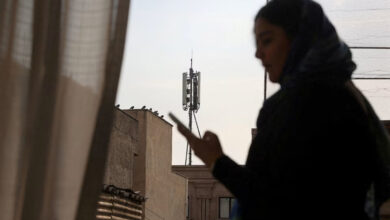Books penned by Church of Scientology founder L. Ron Hubbard are not a common sight in Egypt. Recently, however, Arabic-language translations of the books have begun to appear in Cairo, even bearing the stamp of approval–surprisingly–from Al-Azhar, the highest seat of learning in the Sunni Muslim world.
Hubbard’s book The Way to Happiness, which claims to be a non-religious work, and, more surprisingly, his Dianetics: The Modern Science of Mental Health, which lays some of Scientology’s ‘scientific’ foundations, were made available to Egyptian readers at February’s Cairo International Book Fair.
Both English- and Arabic-language versions of the books were printed in Denmark and shipped to Egypt by New Era Publications International, a publishing house fully dedicated to Hubbard’s books and his doctrine of Scientology.
Scientology is a highly-controversial religious cult, established by Hubbard in the 1950s. Promising to rid the world of its many problems–political, economic and environmental–and relieve its followers of their worldly anxieties, Scientology teaches that human beings are essentially "recycled souls" banished to Earth by an intergalactic despot named Xenu 75 billion years ago. Yet the various "healing" services and treatments are considered to simply be money-grabbing schemes by defectors and detractors. In a 1991 expose by Time Magazine, the church was even described as a "thriving cult of greed and power."
Some members recruited to command positions are asked to sign billion-year contracts, covering this life and all subsequent ones. Created by science-fiction author Lafayatte Ronald Hubbard, Scientology remains highly controversial and is regularly the subject of lawsuits in Europe by people seeking to ban its operations.
The church tries to juggle its high profile with attempts to broaden its following and the stifle public criticism emenating both from within and outside the church.
Mohamed el-Gabry, chairman of Egyptian publishing house Arab Nile Group, which exhibited the book at the fair, pointed to the seal of approval from Al-Azhar on a copy of The Way to Happiness. El-Gabry says he received assurances that Dianetics had been subject to the same vetting process.
"Without this seal of approval, we would have never displayed the book in our booth," he said. "Our library only deals with scientific books–we do not discuss religion."
El-Gabry went on to recount how he had been approached a few years ago by a representative of New Era Publications at the Frankfurt International Book Fair whom he met again in the United Arab Emirates and again last year in Cairo.
Several days later, Magdi Saber, the publication director at the Arab Nile Group, received Al-Masry Al-Youm in his office, and said that he had contacted New Era Publications to discontinue cooperation with them.
"We’re very keen on reader approval," said Saber, "and Hubbard’s books simply failed that condition. Several people, including some working with us, brought to our attention to the Scientology connection and felt uneasy about selling the books. We’ve already packed the books back in their boxes and will be sending them back to the publisher. Dianetics failed to sell a single copy anyway."
But how did books so closely related to an outlawed religion–non-monotheistic religions are not recognized in Egypt–receive approval for distribution from the prestigious Al-Azhar?
The criteria are clear cut, according to Saber: Books that do not directly discuss religion, God, or use prophets’ names–even in metaphors–are generally approved.
"Other books that were also based on pop psychology, such as Dale Carnegie’s How to Stop Worrying and Start Living were approved, even praised" by respected personages, such as iconic scholar Sheikh Mohammed al-Ghazali.
According to Al-Azhar University Professor Ahmed Abdel Khaleq, who is former member of Al-Azhar’s committee on writing and translation, which is tasked with approving such books, "If books do not contradict our morality and traditions, I have no objections."
Abdel Khalek, who has also served as chief-of-staff and translator to the Sheikh of Al-Azhar, sees the topic through the prism of freedom of expression. "We should be open-minded and listen to the other. After all, if I disagree with something in a book, I should write a rebuttal."
He stressed that the books could not be banned simply because of the cult leadership of their author. "I don’t judge authors, I judge books. We don’t ban books by bad Arab authors, do we? We don’t disagree with the person, but we could disagree with the books."
Thomas Göldenitz at New Era Publications’ public relations office said that Al-Azhar’s approval of the books was essential.
"With Hubbard involved, we wanted to have a clear distinction made–we wanted to have a certificate," he told Al-Masry Al-Youm in a telephone call from Denmark. "A publisher wants to make sure."
Goldenitz insisted that the books were entirely non-religious in nature. "Hubbard wrote a lot of things, and not everything is religious," he said. "Perhaps 50 percent or 60 percent of all his writings have nothing to do with Scientology."
"Dianetics was developed long before Scientology," he added. "It is the science of how the mind works, how to improve your IQ and how to [relieve the effects] of traumatic past experiences."
Yet anyone that has come across Scientology recruiters will recognize the themes mentioned by Göldenitz as the same ones recruiters use in their first conversations with a potential convert: freedom from worries and bad memories, nightmares, how to reach a happier state of mind.
The church of Scientology has no official presence in Egypt, nor are there any statistics available on the church’s Egyptian membership. Nevertheless, Egypt is listed on an official church of Scientology website as being a country "in which Dianetics and Scientology services are ministered." And Narconon Egypt, a drug-rehabilitation center, is part of Narconon International, an organization loosely affiliated with the church of Scientology, the official website of which advertises videos for the Narconon program.
Narconon Egypt Executive Director Mohamed Nour Salah acknowledges the affiliation to Narconon International, but disputes the Scientology link.
"The founder of Narconon found inspiration in the books of Hubbard and decided to found a drug rehab center," he said. "But our center is a non-profit organization that has no connections to the Church of Scientology."
"None of our staffers are Scientologists, either," he added. "We started recently conducting awareness campaigns in educational establishments, but our publications have nothing whatsoever to do with religion." The Narconon Egypt website tells a different story. The site mentions Hubbard’s work as inspiration for the organization’s founding. Narconon International’s website, meanwhile, advertises and sells Hubbard’s books.
"That one distributor canceled their purchase is no big deal," said Göldenitz, especially for a major publisher like New Era, which publishes more than 500 books in 50 languages and which realizes annual retail sales of more than US$200 million. "In the business world, that happens every day."
Besides, he says there are plenty of other distributors, in Egypt and beyond. "We distribute in practically all Arab countries," he said. "And we’re focusing on non-religious books, for the time being."




